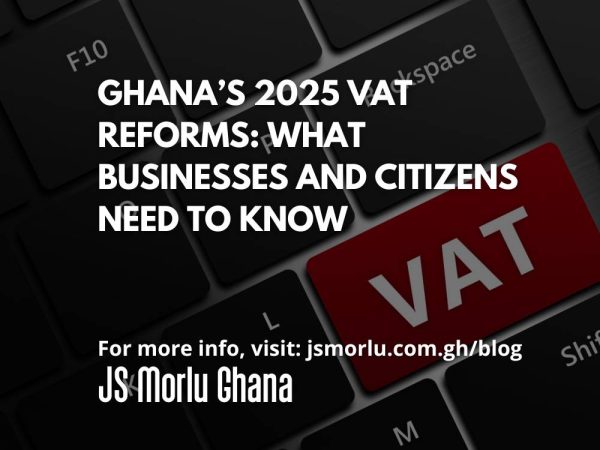In July 2025, the Government of Ghana reaffirmed its commitment to reshaping the nation’s Value Added Tax (VAT) system an initiative that could bring significant changes to businesses, consumers, and the broader economy. As part of the Mid-Year Budget Review presented to Parliament, officials outlined a roadmap for sweeping VAT reforms designed to simplify compliance, reduce inefficiencies, and foster a more business-friendly environment.
Let’s break down what’s happening, why it matters, and what to expect in the coming months.
Why VAT Reform? Addressing a Distorted System
Ghana’s current VAT structure has long been criticized for its complexity and unintended economic consequences. Key issues include:
- Cascading taxes: Certain levies, like the GETFund and NHIS, are layered in ways that multiply tax burdens through the supply chain.
- Fragmented rates: Flat VAT rates applied to select sectors create unfair advantages and inefficiencies.
- Low compliance: A combination of low awareness and complex filing systems has contributed to low VAT compliance, particularly among smaller businesses.
The proposed reforms aim to tackle these problems head-on by restructuring how VAT is calculated, applied, and collected.
Collaboration with the IMF and Stakeholder Engagement
To ensure international best practices and effective execution, the Government sought technical support from the International Monetary Fund (IMF). As of mid-2025, that engagement has been successfully completed.
Now, the Ghana Revenue Authority (GRA) and the Ministry of Finance are conducting a nationwide consultation process. This includes:
- Workshops with traders and business groups
- Public forums and surveys
- Sector-specific discussions
The goal is twofold: educate stakeholders on what’s changing and gather input to refine the final reforms.
This consultation process is expected to wrap up by September 2025. The Ministry plans to draft a new VAT Bill in October 2025, with the aim of submitting it to Parliament as part of the 2026 Budget Statement.
Key Features of the 2025 VAT Reform Package
Here’s what the Government says will be included in the upcoming VAT reform legislation:
1. Abolishment of the COVID-19 Health Levy
Originally introduced as a temporary pandemic response, this levy will be scrapped to ease tax burdens on consumers and businesses.
2. Reduction in Effective VAT Rate
By adjusting rates and streamlining how VAT is charged, the government aims to lower the overall effective VAT rate.
3. Removal of the Cascading GETFund and NHIS Levies
Currently, these levies stack on top of base VAT, increasing the cost of goods. Under the new system, they will no longer contribute to the “cascading” tax effect.
4. Elimination of VAT Flat Rate Scheme (VFRS)
The flat rate system, particularly burdensome for small traders and confusing for enforcement, will be removed in favor of a unified VAT rate.
5. Higher VAT Registration Threshold
To ease pressure on small and micro businesses, the threshold for VAT registration will be raised. This move effectively exempts many informal sector businesses from VAT compliance, encouraging growth and reducing administrative burdens.
6. Introduction of Fiscal Electronic Devices (FEDs)
These devices often seen in more digitized economies will help automate VAT collection and improve transparency. Expect these to be rolled out alongside a nationwide awareness campaign on VAT compliance.
Timeline and Next Steps
| Milestone | Expected Date |
|---|---|
| IMF technical engagement completed | July 2025 |
| Nationwide consultations conclude | September 2025 |
| Draft VAT Bill preparation | October 2025 |
| Parliamentary submission (2026 Budget) | November 2025 |
Final Thoughts
Ghana’s VAT reforms represent a major fiscal policy shift with potential to:
- Simplify business operations
- Improve tax compliance
- Foster fair competition
- Reduce the cost of goods for consumers
These changes reflect the government’s broader strategy to modernize the tax system, enhance economic productivity, and attract investment.
If you’re a business owner, accountant, or policy analyst in Ghana, now is the time to stay informed and engaged. Participate in consultations, review your VAT compliance processes, and prepare for the transition.
Stay tuned, October 2025 is shaping up to be a landmark moment for Ghana’s tax landscape.
